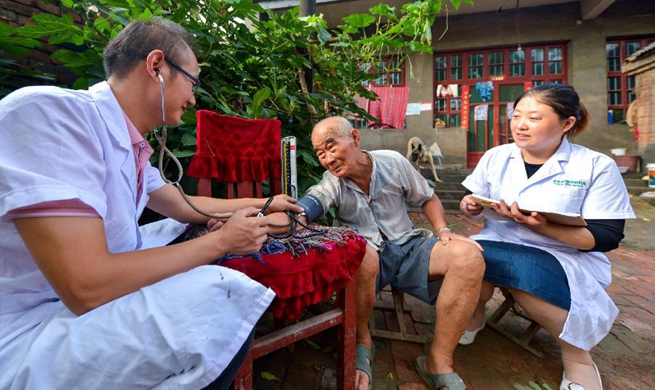BEIJING, Aug. 18 (Xinhua) -- China's experiences and practices in reducing maternal, newborn and under-five mortality rates are "valuable to share with Africa through South-South Cooperation," said UNICEF Deputy Executive Director Shahida Azfar in an interview with Xinhua.
Azfar, who was attending a session themed "China-Africa Cooperation in Maternal and Newborn Health" in Beijing on Friday, appreciated China's political commitment and strong policies, which brought about "tremendous progress" in the country's maternal and child health improvement.
Such experiences are regarded as an immense opportunity to save mothers and children in sub-Saharan Africa, which accounts for 38 percent of global neonatal deaths. Moreover, it bears almost 40 percent of the global burden of neonatal deaths, and the proportion of maternal deaths increased to 66 percent in 2015 from 42 percent in 1990, despite a downward trend of maternal and neonatal deaths worldwide.
Azfar said that African countries had made progress but could learn more from China's experiences. "China's efforts can help give importance to these issues," she said.
China's maternal mortality rate dropped from 89 per 100,000 in 1990 to 19.6 per 100,000 in 2017. Its infant and under-five mortality rate were 6.8 per thousand and 9.1 per thousand in 2017, in comparison with 50.2 per thousand and 61.0 per thousand in 1991 respectively.
For Azfar, the dramatic drops in figures were closely connected to the "availability of resources and trained manpower," which have benefited a broader group of people, including those who are disadvantaged.
China's healthcare system serves as a key factor, according to Azfar, who added that the country's efforts to realize universal health coverage, which is "something that UNICEF supports very much in countries everywhere," played an important role as well.
Between 2009 and 2016, more than 60 million women had cervical cancer screening, over 9 million had breast cancer screening in rural areas, and 74 million pregnant and lying-in women in rural areas received subsidies for hospital deliveries. The hospital delivery rate in rural areas was 99.6 percent in 2017, 7.3 percentage points higher than that of 2008.
"The challenges (facing African countries) are the lack of availability and access to services, which is a key initiative for reducing newborn deaths," Azfar said. "This is something that they can benefit to learn from China's experience."
Public health cooperation was listed among the 10 China-Africa cooperation plans by the Forum on China-Africa Cooperation (FOCAC) Summit in Johannesburg in 2015. That same year, China announced to set up a fund with an initial contribution of 2 billion U.S. dollars, to support South-South Cooperation and assist developing countries in implementing their post-2015 development agenda.
"We were very encouraged by the fund, which will enable the exchange of experience and expertise to take place," said Azfar.
The thematic session on Friday was part of a two-day-long High-Level Meeting on China-Africa Health Cooperation, one of the activities ahead of the FOCAC Beijing summit in September.
While addressing the meeting, Azfar thanked China for its leadership in health cooperation with Africa and said UNICEF is "inspired" by China's Belt and Road Initiative that enhances bilateral cooperation.
"We very much look forward to working with this win-win partnership between China and African countries to further improve the health of mothers and newborns in Africa," she said.













